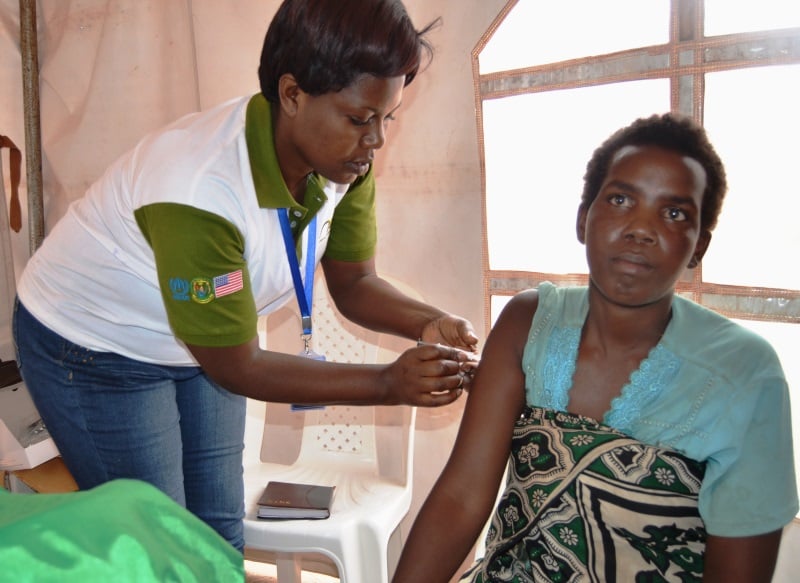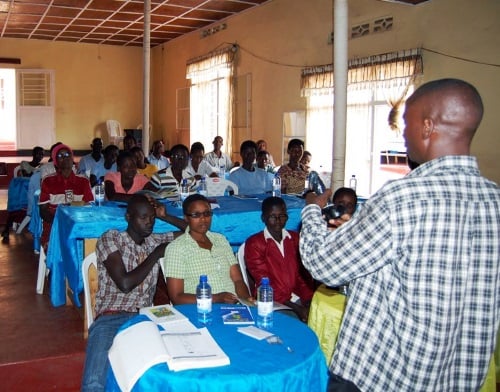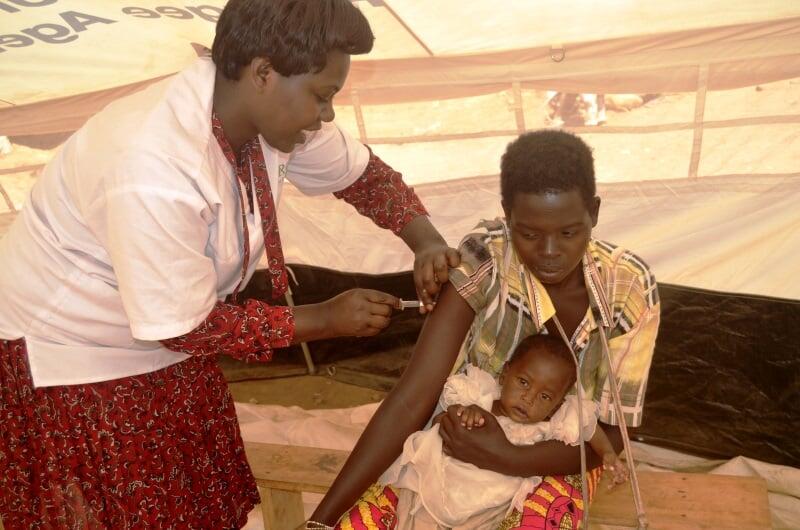MAHAMA REFUGEE CAMP, Rwanda – “I became pregnant when my first child was only three months old,” said Jeannette Murekatete, a Burundian refugee living in Mahama camp. “I have started family planning because I want to have my next baby after five years.”
Just 19 years old, this mother of two young children is navigating challenging circumstances as a refugee: “The conditions in the camp don’t allow us to have many children. For example, it is very difficult to provide milk for the children,” she said.
Thanks to UNFPA’s support to family planning in Mahama camp, she is able to control her own fertility. She has opted for the three-monthly injectable contraceptive Depo-Provera, which she receives at the camp’s family planning clinic.
Like Ms. Murekatete, Jeanine Itangishaka, 24, finds conditions in the refugee camp unfavourable to mothers. “Whenever I am pregnant I am very selective with food, so I have to take measures to avoid getting pregnant while still here,” she said.
“Young people prefer injectable contraceptives. They don’t like pills, which can make their parents suspicious.” - Marie Nyirahirwa, midwife
Ensuring access to services
The in-camp clinic run by the American Refugee Committee (ARC) began offering family planning services in August this year. Around 140 women received family planning services within the first three weeks of its operation, said Marie Nyirahirwa, a midwife in charge of family planning.

Most women who opt for family planning are in the 20-35 years age group, she said. However, she also serves unmarried adolescents. “Young people prefer injectable contraceptives. They don’t like pills, which can make their parents suspicious,” she said.
UNFPA has provided over 100,000 male and female condoms to Mahama camp as well as to Bugesera and Nyanza reception centres, and has also supported the training of 110 community health workers at the camp.
One of them is Cyprien Ntaryamira, 26, who has led five women to receive family planning services since 11 August: "Burundians in this camp are eager to learn about the benefits of family planning, but it takes time to change people's attitudes because culturally, Burundians want to have many children," he said.
These health workers sensitize the refugee community about health issues, including sexual and reproductive health. Each community health worker monitors 46 homes of around 300 people, according to Dennis Sezibera, ARC Community Health Officer in Mahama camp.
The need for more sensitization
In Mahama camp a young couple who have two children, Etienne Karegera, 26, and Joseline Nyiramajyambere, 24, discussed the need for information about family planning.
“I know nothing about family planning,” said Mr. Karegera, who wants at least eight children. “No one has ever told me about it. I would like to learn about its advantages.”
But Ms. Nyiramajyambere is familiar with the concept because of information she received from community health workers in Burundi. She would like four children. “I learned about the importance of child spacing,” she said.
“There are thousands of condoms in the health centre but many young people do not know how to use them.” – Philbert Bigirimana, 24
Adolescent sexual and reproductive health
Philbert Bigirimana, 24, has been in Mahama camp since May. He believes that young people need a special programme designed for them to access ASRH services and information. “There are thousands of condoms in the health centre but many young people do not know how to use them,” he said.
Fiesta Nizeyimana, 23, agrees with Mr. Bigirimana. “We want a separate programme where young people can discuss sexuality issues without the interference of adults,” she said. “We want to have our own peer educators who can also distribute condoms to us. It is more effective.”
 A Burundian community health worker demonstrates to colleagues how a condom is used. © UNFPA / Salim Bucyanayandi |
Salim BucyanayandiMany young people have had unprotected sex because of lack of sensitization, according to Patrick Manirakiza, 21: “My housemate has had two sex partners, staying with each for a week and having unprotected sex. We need a strong sensitization programme for young people.”
This situation is about to change. ARC is planning to start a programme for peer educators who would help sensitize the youth about sexuality issues and distribute condoms to them, Mr. Sezibera confirmed.
For Denise Mugiraneza, 19, another issue young people have to deal with is idleness. “The biggest problem we have is we are idle. We stay very close to our male age-mates and converse all day,” she said. She suggested an integrated package for young people that provides something to occupy their time as well as sensitization on sexual and reproductive health.
By David Ssekyanzi



